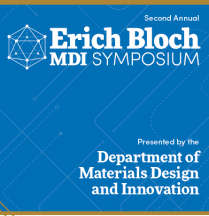2018 Erich Bloch Symposium
June 4 - 5, 2018 | Buffalo, NY
This annual symposium is dedicated to the late Erich Bloch, former director of the National Science Foundation who helped endow the Department of Materials Design and Innovation at UB.
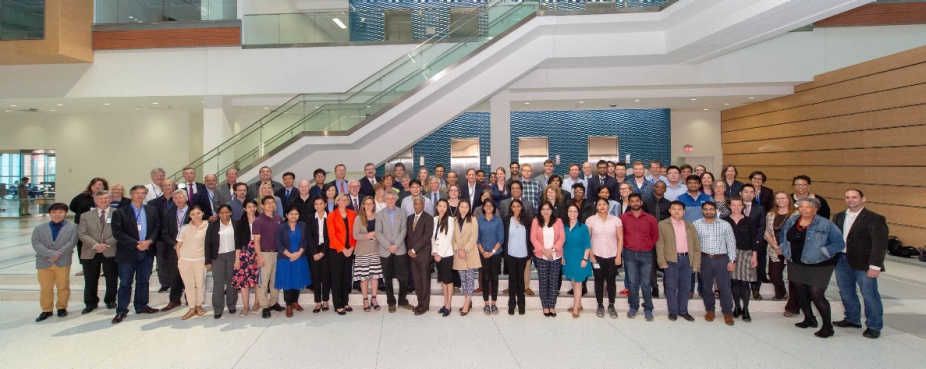
2018 Erich Bloch Symposium group photo of speakers and faculty.
Speakers
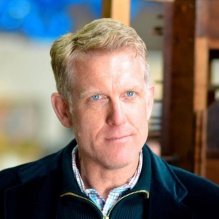
E. Frits Abell
Managing Director, Echo Creative Ventures, Inc.
Over the past 18 years, Frits Abell has helped found and/or build several companies in Boston, Buffalo and New York City; these include a digital media company, a business consultancy, and an investment bank. As such, Frits has developed deep experience in marketing, corporate development and operations for startups and mid-stage ventures, for which he manages all aspects of new business formation. Frits has a deep network that ranges from financial and strategic investors to entrepreneurs of early stage ventures to strategic acquirers. Frits is unwavering about three things: his drive to start new initiatives, his passion for social ventures, and his love for connecting people. As such, his focus has been on the formation and/or growth of a number of Buffalo-based early stage ventures, including Viridi Parente, Inc. (Green Machine), Plume Coffee & Roastery, echo Art Fair, Solid716, Coolture, and Anna Kaplan Contemporary. He has also served on boards/committees for Arts Services Initiative (ASI), Preservation Buffalo Niagara (PBN), Legacy Cities, Visit Buffalo Niagara (VBN), and DesignBuffalo.
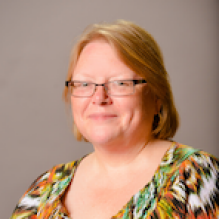
Lauren Asplen
Director, Healthy Sustainability Program, BlueGreen Alliance
Lauren Asplen is the Director of the BlueGreen Alliance’s Healthy Sustainability Program. Asplen has more than two decades’ experience working with trade unions, primarily in the manufacturing and transportation sectors. Most recently, she spearheaded a program that gained White House recognition as a “Champion of Change” for engaging front-line workers in identifying energy efficiency opportunities.
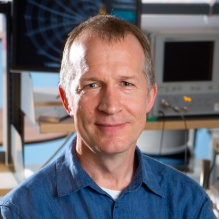
Jonathan Bird
Professor and Chair, Department of Electrical Engineering, University at Buffalo
Jonathan Bird is both the chair of the Electrical Engineering Department and an Adjunct Professor in the Department of Physics, as well as a Visiting Professor at Chiba University in Japan. Prior to joining UB, Bird was an Associate Professor in the Department of Electrical Engineering at Arizona State University. He is a Fellow of the Institute of Physics and was NYSTAR Distinguished Professor of 2003.
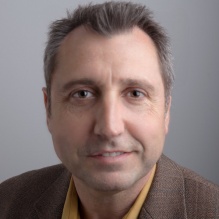
David Castillo
Professor of Romance Languages and Literatures; and Director, Humanities Institute, University at Buffalo
David Castillo is the UB Director of the Humanities Institute and Professor of Spanish in the Department of Romance Languages and Literatures, where he served as Chair between 2009 and 2015. He is the author of “Awry Views: Anamorphosis, Cervantes and the Early Picaresque and Baroque Horrors: Roots of the Fantastic in the Age of Curiosities” and co-author of “Zombie Talk: Culture, History, Politics and Medialogies: Reading Reality in the Age of Inflationary Media.” He is a habitual UB “Scholar on the Road,” and has made media appearances in The New York Times, The Voice of America, NPR, and other outlets.
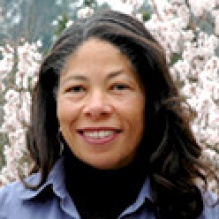
Sheila Davis
Executive Director, Silicon Valley Toxics Coalition
In her time at the Silicon Valley Toxics Coalition, Sheila Davis has had an important hand in shaping environmental policy in the high-tech industry. She researched and developed the first electronic recycling legislation to be passed in California, and spearheaded the first pilot programs in the country to collect and recycle residential electronic waste. Before becoming SVTC’s executive director, she served as program director of SVTC’s Sustainable Technologies Program. Davis served as a journalist, state legislative aide and community development specialist before joining the staff of SVTC.
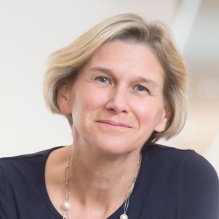
Liesl Folks
Dean, School of Engineering and Applied Sciences and Professor of Electrical Engineering, University at Buffalo
Liesl Folks is Dean of the School of Engineering and Applied Sciences and a professor in electrical engineering at the University at Buffalo. Prior to joining UB in 2012, she spent 16 years in research and development in the magnetic data storage industry in Silicon Valley, working for IBM, Hitachi and Western Digital. Her research is in the fields of magnetic materials and devices, nanoscale metrology, and spin-electronic devices. She was president of the IEEE’s Magnetics Society in 2013-2014 and in 2012, she served on the congressionally mandated panel for the Triennial Review of the National Nanotechnology Initiative, facilitated by the National Academy of Sciences.
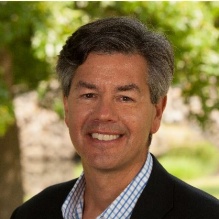
John Fullerton
Founder and President, Capital Institute
John Fullerton is the Founder and President of Capital Institute, a collaborative working to explore and effect the economic transition to a more just, regenerative, and sustainable way of living on this earth through the transformation of finance. He is also the Principal of Level 3 Capital Advisors, LLC. Previously, Fullerton was a Managing Director of JPMorgan. He is a Co-Founder and Director of Grasslands, LLC, a holistic ranch management company in partnership with the Savory Institute, and a Director of New Day Farms, Inc., New Economy Coalition, and Savory Institute.
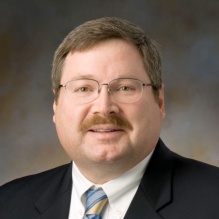
David Furrer
Senior Fellow Discipline Lead, Pratt and Whitney; and incoming president of ASM International, the Materials Information Society
David U. Furrer leads all of the materials discipline chiefs and materials fellows at Pratt & Whitney in developing technical strategy and improving all materials engineering work. Previously he served as Chief of Strategic Materials and Process Technology at Rolls-Royce and Chief Metallurgist at Ladish Company Inc. Throughout his career, Furrer has worked to establish closer links between materials technology and other engineering functions. His contributions have advanced processing methods for a wide range of materials, enabling higher-performance components for turbine engines, airframes, and rocket applications.
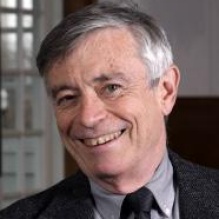
Kenneth Geiser
Professor Emeritus, University of Massachusetts, Lowell
Kenneth Geiser is Professor of Work Environment and Director of the Lowell Center for Sustainable Production at the University of Massachusetts Lowell. He is one of the authors of the Massachusetts Toxics Use Reduction Act and served as Director of the Massachusetts Toxics Use Reduction Institute from its founding in 1990 to 2003. His research and writing focus on pollution prevention and cleaner production, toxic chemicals management, international chemicals policy, safer technologies, and green chemistry. He has served on various advisory committees for the U.S. Environmental Protection Agency, and the United Nations Environment Program.
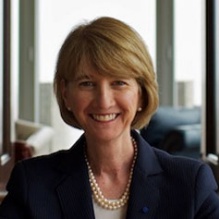
Kristina M. Johnson
Chancellor, State University of New York and Professor of Electrical Engineering, University at Buffalo
Kristina M. Johnson is the 13th Chancellor of The State University of New York. Immediately prior to joining SUNY, Dr. Johnson was co-founder and CEO of Cube Hydro Partners, LLC, a clean-energy infrastructure company focused on building and operating hydropower plants in North America. Johnson served as Under Secretary of Energy at the U.S. Department of Energy, and has served as Provost and Senior Vice President for Academic Affairs at Johns Hopkins University and as Dean of the Pratt School of Engineering at Duke University. Johnson was inducted into the Women in Technology International Hall of Fame and the National Inventors Hall of Fame.
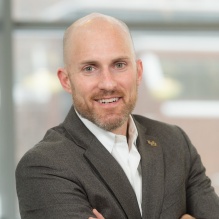
Kemper Lewis
Chair and Professor, Department of Mechanical and Aerospace Engineering, University at Buffalo; and Director, Sustainable Manufacturing and Advanced Robotic Technologies (SMART) Community of Excellence
Kemper Lewis is professor and chair of the Department of Mechanical and Aerospace Engineering at the University at Buffalo. He is also the director of UB’s Community of Excellence in Sustainable Manufacturing and Advanced Robotic Technologies, an initiative that harnesses the strengths of faculty across the university to develop advanced manufacturing processes and technologies that enable cost-effective design of highly customizable, high-quality products. He teaches and conducts research in the areas of design theory, system optimization, decision modeling and design analytics.
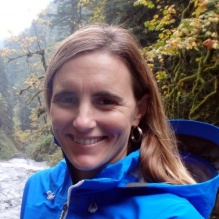
Alexandra McPherson
Principal, Niagara Share
Alexandra McPherson has spent the last twenty years leading innovative environmental initiatives that leverage the collective creativity of communities and industries. Niagara Share builds cross sectoral partnerships that advance social and environmental entrepreneurship. She co-leads the Collaborative for the Regenerative Economy with the University at Buffalo's Materials Design and Innovation Department and Clean Production Action. McPherson also leads the Investor Environmental Health Network, an investor collaborative housed at CPA, that builds corporate support for green chemistry initiatives in partnership with its membership network of 30 investment organizations managing over $60B in assets.
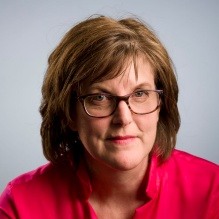
Sarah O’Brien
Director, Clean Electronics Production Network
As Director of the Clean Electronics Production Network, Sarah O’Brien supports leading electronics stakeholders pursuing the audacious goal of moving toward elimination of worker exposure to toxic chemicals in the electronics supply chain. O’Brien served as an expert on environmentally sustainable purchasing on the stakeholder development team that created the original environmental electronics procurement criteria and system, then engaged for a decade with purchasers and manufacturers around the world to ‘green’ their production and procurement of electronics. Previously, with Hospitals for a Healthy Environment and INFORM, O’Brien assisted organizations in improving their environmental performance through procurement policy and contract development.
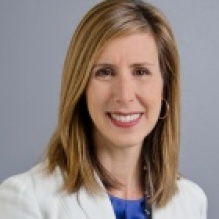
Christina Orsi
Associate Vice President, Economic Development, University at Buffalo
As the Associate Vice President, Economic Development, Christina Orsi works to help businesses and other community partners connect with UB researchers and resources, including workforce development training, entrepreneur support and access to programs like START-UP NY, to advance UB’s mission as an economic engine in Western New York and beyond. Orsi supervises the WNY Incubator Network and UB’s Center for Advanced Biomedical and Bioengineering Technology. Prior to joining UB, she provided strategic direction for the Western New York Regional Economic Development Council and played an integral role in NYS State Governor Cuomo’s Buffalo Billion economic development plan.
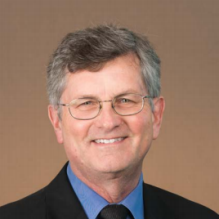
William T. Petuskey
Professor, School of Molecular Sciences; and Director, Advanced Materials Initiatives, Arizona State University
William T. Petuskey is Professor of chemistry and biochemistry in the School of Molecular Science at Arizona State University and is also Director of ASU’s Advanced Materials Initiative. Prior to joining ASU, he was research associate at the Universität Hannover, Germany and assistant professor of ceramic engineering at the University of Illinois at Urbana Champaign. He served ASU as chairman of its Department of Chemistry and Biochemistry and Associate Vice President of Science, Engineering and Technology. His research activities are devoted to the synthesis and physical chemistry of nano-scaled ceramics.
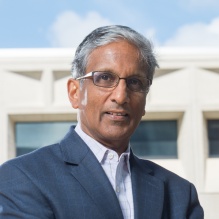
Krishna Rajan
Erich Bloch Chair and Empire Innovation Professor, Department of Materials Design and Innovation, University at Buffalo
Krishna Rajan, the Erich Bloch Chair and Empire Innovation Professor of the University at Buffalo’s Department of Materials Design and Innovation. He is the founding editor-in-chief of the new journal Materials Discovery, and serves on numerous national and international panels, including the National Academy of Sciences’ Member Science and Technology Experts Group: National Academies of Sciences, Engineering, and Medicine. He has received numerous awards and recognitions, including most recently the Alexander von Humboldt Research Award. He was a staff scientist at the National Research Council of Canada and then served on the faculties at Rensselaer Polytechnic Institute and Iowa State University.
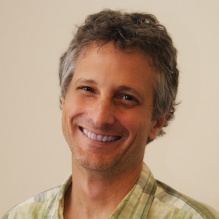
Mark Rossi
Executive Director, Clean Production Action
Part of the Clean Production Action team since 2004, Mark Rossi has the unique ability to bring together diverse groups and achieve innovative outcomes. In 2006, he founded BizNGO, a collaboration of organizations who work together to advance safer chemicals and sustainable materials. Innovative products of BizNGO include the Alternatives Assessment Protocol, Guide to Safer Chemicals, and Plastics Scorecard. He is also the co-author of the hazard assessment tool GreenScreen. In 2014, he co-founded the Chemical Footprint Project, an initiative to benchmark corporations on their overall chemical management performance. Rossi is a research fellow at the Lowell Center for Sustainable Production.
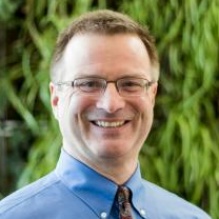
Charles Ruffing
Director, New York State Pollution Prevention Institute, Rochester Institute for Technology
Charles Ruffing has 23 years of experience in health safety and environment technical science and management. As the Director of the New York State Pollution Prevention Institute, he leads a team of 21 engineers, technical staff, outreach specialists and students in delivering pollution prevention information, research, and direct assistance to NYS businesses and citizens. Prior to joining NYSP2I, Chuck held various positions at Eastman Kodak Company spanning 20 years, and since 2010 held the position of Vice President of Health, Safety, Environment and Sustainability at Eastman Kodak Company.
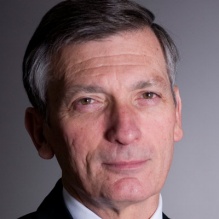
Donald R. Sadoway
John F. Elliott Professor of Materials Chemistry, Massachusetts Institute of Technology
Don Sadoway’s research seeks to establish the scientific underpinnings of technologies that make efficient use of energy and natural resources in an environmentally sound manner. Sadoway is a co-founder of Ambri, Inc., which is commercializing the liquid metal battery technology for grid-scale energy storage, and a co-founder of Boston Metal, which is commercializing molten oxide electrolysis for the production of metals. Sadoway’s influence reaches beyond the lecture hall – his TED Talk has more than 1.8 million views, he has appeared on widely-watched TV shows such as the Colbert Report, and in 2012 he was named by TIME magazine as one of the 100 most influential people in the world.
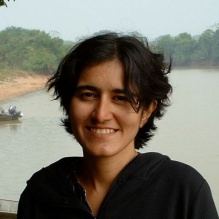
Payal Sampat
Mining Program Director, Earthworks
Payal Sampat currently leads Earthworks’ No Dirty Gold corporate/markets campaign, and leads their global efforts to monitor and reform the mining industry, working with communities affected by mining and local organizations from around the world. Sampat joined Earthworks in 2002 from the Worldwatch Institute where she remains a Senior Fellow. At Worldwatch, she researched and wrote about mining, materials, freshwater, and natural resources issues. Sampat began her environmental career as an organizer for the Bombay Environmental Action Group, in Bombay, India, where she worked on campaigns to protect coastal areas and public lands.
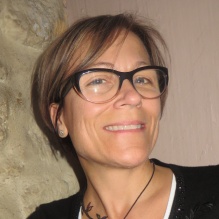
Linda Sapochak
Director, Division of Materials Research, National Science Foundation
Linda Sapochak is the Division Director for the Division of Materials Research at the National Science Foundation. She has worked in DMR since 2008 as Program Director for the Solid State and Materials Chemistry Program, and the Materials Research Science and Engineering Center program since 2014. She also managed projects under the Emerging Frontiers in Research and Innovation: Green Sustainable Buildings, Sustainable Energy Pathways and I-Corps. Prior to her position at NSF, Sapochak was an Assistant Professor in the Chemistry Department at the University of Nevada, Las Vegas.
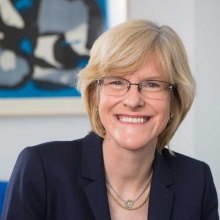
Robin Schulze
Dean, College of Arts and Sciences and Professor of English, University at Buffalo
Robin Schulze is the Dean of the College of Arts and Sciences and a professor of English at the University at Buffalo. She specializes in modernist American poetry, textual scholarship and editorial theory, and modernist literature and culture. Prior to her appointment, Schulze served as Associate Dean for the Humanities, College of Arts and Sciences, at the University of Delaware. She came to Delaware from Penn State University, where she taught for more than a decade before accepting the position of head of the Department of English in 2007. Schulze has received prestigious grants from the UNIDEL Foundation, the American Philosophical Society, and the Oregon State University Center for the Humanities, among others.
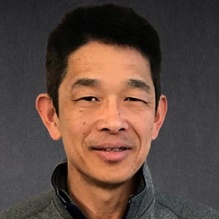
Mark Shima
President, Panasonic Eco Solutions Solar New York America
Mark is a leading international expert on next generation solar manufacturing, and has overseen factories in Oregon and across Asia. He now leads the Buffalo manufacturing site. In his role at Panasonic, Shima has extolled the company’s philosophy to, “develop people before producing the products,” as he has expanded the workforce in Buffalo.
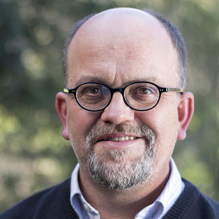
Jim Vallette
Research Director, Health Building Network
In his role as Research Director for the Health Building Network, Jim Vallette works to understand and explain industry’s impacts on people and the planet. His findings have supported major global policy developments like the Basel Convention ban on toxic waste trade and national and international finance bans on overseas fossil fuel extraction. Vallette has helped to develop the Healthy Building Network’s groundbreaking research on how building materials are made, and what the impacts are on building occupants, construction workers, fenceline communities, and the global environment.
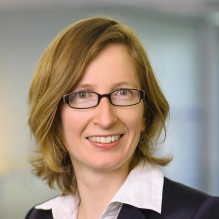
Helga Vanthournout
Senior Knowledge Expert, Center for Business and the Environment, McKinsey & Company, Geneva, Switzerland
Helga Vanthournout has worked around the world with clients in the materials, engineering, and consumer sectors to identify how they can grow and innovate by reducing their lifetime material intensity. In the field of waste management, Vanthournout has helped regional, state, and city governments to develop new management strategies, evaluate privatization options, and craft implementation plans. She has also done substantial work on organizations’ broader sustainability agendas. Before joining McKinsey in 2006, Vanthournout was a scientific officer at the European Chemicals Bureau of the European Commission, where she researched life-cycle assessment approaches.
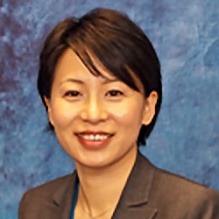
Grace Wang
Interim Provost and Senior Vice Chancellor for Research and Economic Development, State University of New York; and Professor, Department of Materials Design and Innovation, University at Buffalo
Grace Wang was appointed vice chancellor for research and economic development by the SUNY Trustees in January 2017. Wang supports the SUNY Chancellor and Provost in advancing SUNY’s overall strategy and mission, and serves as a liaison to the SUNY Board of Trustees in the areas of research and economic development. Prior to joining SUNY, Wang served as acting assistant director for engineering at the National Science Foundation (NSF). In this role, she led the Engineering Directorate, managing a funding portfolio of over $900 million dedicated to conducting frontier engineering research, supporting engineering education, and fostering innovation and technology commercialization.
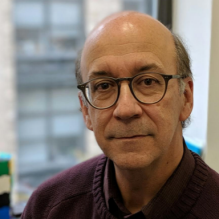
Michael Ward
Silver Chair Professor of Chemistry; and Director, Molecular Design Institute, New York University
Michael D. Ward is the Silver Chair Professor of Chemistry and the founder of the Ward Group at NYU - a highly interdisciplinary research group at the intersection of organic solid-state chemistry, physical chemistry, materials science, and biomedical chemistry. He has served as an editor for the ACS journal Chemistry of Materials since 1998, and is a Fellow of the Materials Research Society, the American Chemical Society, the American Association for the Advancement of Science, and the European Academy of Sciences. As Director of two NSF-supported MRSECs at two different institutions he has steered research programs impacting hundreds of undergraduates, graduate students and postdocs.
MDI Summer Institute
The 2018 Summer Institute included additional events in conjunction with the Erich Bloch Symposium. On June 6, the Collaboratory for a Regenerative Economy (CoRE) hosted a workshop – the CoRE Change Agent Summit. On June 2, MDI and CoRE participated in the Western New York Youth Climate Action Summit.
CoRE is funded with generous support from The JPB Foundation.
Event Start Date: June 4, 2018 This content is archived.
